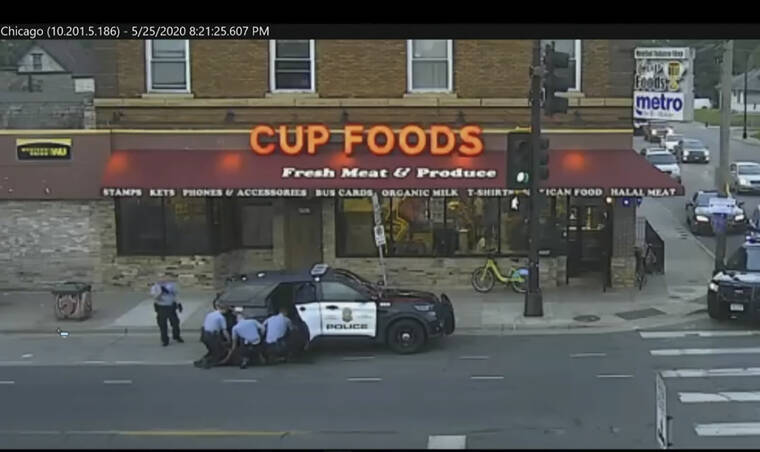Witness at officers’ trial says he believed Floyd would die
ST. PAUL, Minn. — A bystander who feared George Floyd would die under the knee of former Minneapolis police Officer Derek Chauvin wept on the stand Tuesday at the federal civil rights trial of three other officers, as prosecutors attempted to show that even people without medical training knew Floyd needed help.
Footage shown to the jury showed Floyd struggling with officers as they try to put him in a police vehicle, officers holding the handcuffed man facedown on the ground and the 46-year-old Black man gasping for air as a growing group of onlookers warned that Chauvin was killing him. Former Officers J. Alexander Kueng, Thomas Lane and Tou Thao are broadly charged with depriving Floyd of his civil rights while acting under government authority.
Floyd died after Chauvin knelt on his neck for 9 1/2 minutes. Kueng knelt on Floyd’s back, Lane held his legs and Thao kept bystanders back, according to prosecutors. The May 25, 2020, killing triggered worldwide protests and a reexamination of racism and policing.
Kueng, who is Black; Lane, who is white; and Thao, who is Hmong American, had basic medical training and are all are charged for failing to provide Floyd with medical care. Thao and Kueng face an additional count for failing to stop Chauvin, who is white. Both counts allege the officers’ actions resulted in Floyd’s death. Chauvin was convicted of state murder and manslaughter charges last year and pleaded guilty to a federal civil rights violation.
Charles McMillian wept as prosecutors played video in which McMillian pleads with officers to let Floyd breathe, prompting a warning from the judge that prosecutors were to avoid eliciting emotional responses.
“I knew something bad was going to happen to Mr. Floyd,” McMillian testified.
“What did you mean by that?” prosecutor Allen Slaughter asked.
“That he was gonna die,” McMillian responded.
When questioned by defense attorneys, McMillian acknowledged he did not see or hear several things, including Lane asking if Floyd should be rolled onto his side and later doing chest compressions, and Kueng saying that he couldn’t find a pulse.
“You could only see or hear things from your perspective, is that correct?” Tom Plunkett, Kueng’s attorney, asked.
McMillian agreed.
McMillian, like most witnesses who took the stand Tuesday, also testified at Chauvin’s state trial last year.
The footage shown to jurors included police body camera video, surveillance video and widely viewed bystander video that also was played during that trial. At least one juror on Tuesday appeared to be dabbing her eyes as she watched footage showing Floyd struggle with police and crying, “I can’t breathe,” while bystanders shouted at the officers.
Police had responded to a 911 call that Floyd tried to use a counterfeit $20 bill to buy a pack of cigarettes at a corner store.
Jenna Scurry, a 911 dispatcher, testified that after Lane and Kueng responded, she called for backup for them. They then called for an ambulance without lights and sirens, for a mouth injury, because Floyd was bleeding. More than a minute later, Chauvin and Thao upgraded that request to have the ambulance come with lights and sirens. But Scurry said she was not told that Floyd wasn’t breathing, had no pulse and was unresponsive.
If she had known someone was having trouble breathing, Scurry testified, she would have also called the fire department, because “they can get there faster sometimes. … They can be almost anywhere within four minutes.”
Earlier, prosecutors played video from Thao’s body camera that showed him pushing an onlooker.
The cashier who had taken the counterfeit bill, Christopher Martin, 20, testified that he had recorded about 30 seconds of video as bystanders were yelling at Thao to check Floyd’s pulse, but stopped when Thao pushed the other man. Martin said he didn’t have a good view of Kueng or Lane.
While cross-examining Martin, Thao’s attorney, Robert Paule, noted that Thao put his hand up before pushing the man, and that the man didn’t listen to Thao’s direction to get back on the curb. Paule said that when Thao pushed the man, he swatted Thao’s hand away.
U.S. District Judge Paul Magnuson has said the trial could last four weeks.
Lane’s attorney has said his client will testify, but it’s not known if Thao or Kueng will. It’s also not clear whether Chauvin will testify, though many experts who spoke to The Associated Press believe he won’t.
Lane, Kueng and Thao also face a separate state trial in June on charges they aided and abetted both murder and manslaughter.
———
Webber contributed from Fenton, Michigan.
———
Find AP’s full coverage of the killing of George Floyd at: https://apnews.com/hub/death-of-george-floyd

